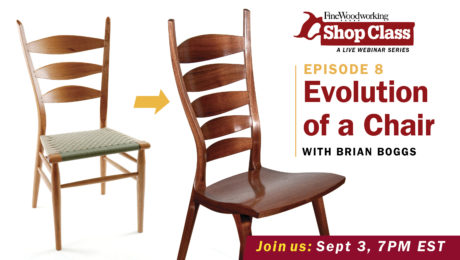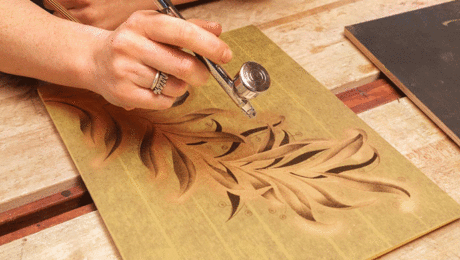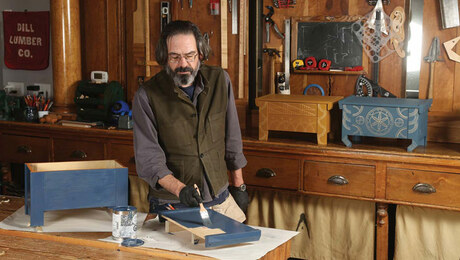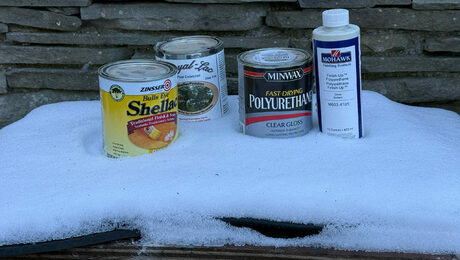STL223: Mike Mascelli knows more about finishing than you do
Mike Mascelli wows Bob Van Dyke and Mike Pekovich answering listener questions in this (mostly) finishing-centric episode. |
Question 1:
Hi Guys,
I am finishing up a new small shop in my backyard. I’ve put in duel pane windows and am finishing up insulating the walls and ceiling. I intend to install a vented gas wall heater to warm it in the winter. I plan to heat to about 50 degrees in the winter. What I’m wondering is whether that is warm enough to put on finish? Most of my finishes will be shellac or varnish while painting shop furniture. Do I need to turn up the heat when finishing? I really enjoy listening to the podcast.
Thanks,
Bob
Question 2:
I recently finished a farmhouse table using reclaimed pine (beams and 2x4s from taking down a wall in our 40s cape cod). I wanted to give the wood an old tone and decided on some amber shellac instead of figuring out conditioning and keeping stain from splotching. I now realize my canned shellac was probably 6-8 years old (and that it had exceeded is shelf life). The first meal eaten on the table has caused warm (hot) plates to “melt” the finish causing marks and placemats to stick, cold glasses to ring, & fingerprints and marks from general contact.
I know now that that old shellac was a mistake, and maybe even shellac in general for a dining table. Can I salvage the finish with a coat of two of fresh shellac and make it harder and less susceptible to hot plates and cold glasses leaving marks? Can I place a tougher clear top coat that will adhere to the waxed shellac? Or am I stuck with removing it and starting the finish process all over?
Thanks
Jason
Question 3:
Hi Shop Talk,
I know that Mike and Bob Van Dyke are big fans of adding extended plexi-glass bases on routers. Can you share more about why they are so helpful, and how we might go about doing this at home? What is the thickness of the plastic? Does it come from the home center, or do we need to get pre-drilled universal bases from woodworking suppliers (which can be expensive). Are the routers center on the extended base or favored to one side and top or bottom?
Thanks! Stay safe out there.
Chris
Question 4:
Hi Guys,
I’ve been relistening to some of the old episodes. In #59 a question was asked about comparing Danish oil and wiping varnish. One of the statements mentioned “real varnish”. I was wondering what “real varnish” means. Enjoy your program immensely.
Thanks,
Bob
Every two weeks, a team of Fine Woodworking staffers answers questions from readers on Shop Talk Live, Fine Woodworking‘s biweekly podcast. Send your woodworking questions to [email protected] for consideration in the regular broadcast! Our continued existence relies upon listener support. So if you enjoy the show, be sure to leave us a five-star rating and maybe even a nice comment on our iTunes page.



























Comments
Gonna be that guy on the internet: There are usually two different clear plastics available Acrylic and Polycarbonate (PC). Plexiglas is a brand of acrylic and is like Kleenex (also a brand name) in that it gets used generically a lot. See also Xerox. Acrylics can be cast or extruded and tend to be a lot harder and more scratch resistant than polycarbonates. In my experience, acrylic machines more easily, especially the cast acrylic as it has fewer internal stresses than the extruded. The harder acrylic is more brittle and tends to shatter, so your safety glasses are PC. PC scratches easily and bends more, but has incredible impact resistance. Lexan is a brand name of PC.
Must have made Mike P's day. Another use for blue tape.
That's the way I've always understood it as well. Lexan ( a PC) was the material frequently found in bulletproof shields in banks. Tuff stuff.
Just saw this show on tape, while taking a break from a frustrating jig. Holy Smokes, what a great show! Even if I wasn't interested in finishing, Mike Mascelli was fascinating just talking about chemistry or the history of finishing. But the overview, the basics, the details, and the techniques he shared were fabulous. And to you Mike Pekovich, you did a wonderful job filling in as podcast host.
I have been to classes at CVWW. So, Bob Van Dyke, please invite Mike Mascelli back in the future. I'll be there.
The previous posts about clear plastics match what I have learned.
When I want cheap lenses for my eye glasses, they are acrylic. When I want OSHA approved safety lenses, they are polycarbonate. Of course, I always pay the upgrade charge and get polycarbonate.
In my school administrator days, we would replace broken window glass with polycarbonate because of the strength and impact resistance. And our maintenance guys could cut it on a table saw, unlike tempered glass. The material is softer than acrylic or glass. So it scratches and clouds over from cleaning more readily than acrylic or glass. I use both acrylic and polycarbonate in my shop depending upon the application and what I have on hand.
The show flowed smoothly from one topic to another, including tons of info without the usual BS banter and laughter. Mike P did a great job at hosting.
REALLY enjoyed the information on finishes. Also the in depth on plastics.
Great show Mike, Bob and Mike. Another great team.
Tell us more about Mirka Mirlon, which and how are you using it. It comes in a variety of formats and grits. Sounds like Mike said, “an article there”. I can see several articles stemming from this show alone.
Keep up the great work.
Marty
Absolutely the best STL yet.Nothing else to say.
I want to know which Italian restaurant Bob and Mike went to in Saratoga, because I have never eaten in a decent Italian restaurant there, or even much of any kind of restaurant.
Excellent session - better than usual. Only problem is the plastics confusion.
Polycarbonate is a class of plastics with somewhat different resins, all of which have multiple carbonate complexes in the polymer. The various compositions vary in density, with Lexan being a brand name of one of the denser and tougher compositions. PC can be cold formed - that is, you can bend it at room temperature without breaking.
Plexiglass is a brand name of PMMA/acrylic plastic. Different chemistry and different properties. Acrylic can not usually be cold formed as it is brittle at room temperature. It is harder than PC, resisting scratching better, but it can shatter on impact. Generally less expensive than PC. To form acrylic into shapes it has to be heated.
Either would be fine for the router base unless you really want to abuse it.
Log in or create an account to post a comment.
Sign up Log in